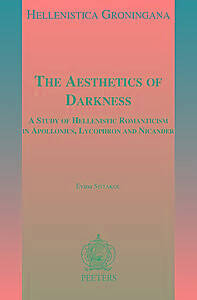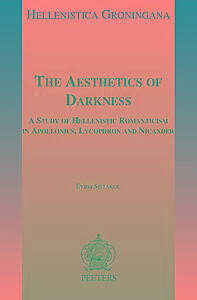
- Retrait gratuit dans votre magasin Club
- 7.000.000 titres dans notre catalogue
- Payer en toute sécurité
- Toujours un magasin près de chez vous
- Retrait gratuit dans votre magasin Club
- 7.000.0000 titres dans notre catalogue
- Payer en toute sécurité
- Toujours un magasin près de chez vous
The Aesthetics of Darkness
A Study of Hellenistic Romanticism in Apollonius, Lycophron and Nicander
E Sistakou
58,00 €
+ 116 points
Description
Darkness in literature manifests itself as a fascination with the evil passions of man, an emphasis on the ugly and the monstrous, an obsession with morbidity and death, a blurring of the boundaries between reality and imagination; its effect ranges from pleasure in the representation of horror to the overwhelming sense of the sublime. The premise that these trends find their most powerful expression in Romantic literature forms the basis for the exploration of darkness in Hellenistic poetry in the present study: Apollonius' Argonautica, a dark romance building around a heroic quest, is read against the background of fantasy literature and the Gothic novel; Lycophron's Alexandra, a dark remake of Kassandra's prophecy, is seen as an extreme paradigm of Gothic aesthetics; Nicander's Theriaca and Alexipharmaca, two didactic poems on snakes and their antidotes, are reviewed in the light of Romantic science and the aesthetics of Decadence. The introduction provides the theoretical framework where key notions are discussed-the fantastic, the Gothic, the grotesque, the uncanny-, whereas the afterword offers an explanation for the parallelism between the Hellenistic and the Romantic era by reference to their ideological and cultural contexts. The Aesthetics of Darkness is a comparative study which combines the 'close reading' of the Greek texts with literary criticism as well as with specific examples drawn from nineteenth century literature; by thus transcending the boundaries of conventional scholarship, the book attempts to capture the Romantic awakenings of post-Classical literature.
Spécifications
Parties prenantes
- Auteur(s) :
- Editeur:
Contenu
- Nombre de pages :
- 311
- Langue:
- Anglais
- Collection :
- Tome:
- n° 17
Caractéristiques
- EAN:
- 9789042926547
- Date de parution :
- 04-10-12
- Format:
- Livre broché
- Format numérique:
- Trade paperback (VS)
- Dimensions :
- 157 mm x 239 mm
- Poids :
- 458 g

Les avis
Nous publions uniquement les avis qui respectent les conditions requises. Consultez nos conditions pour les avis.






